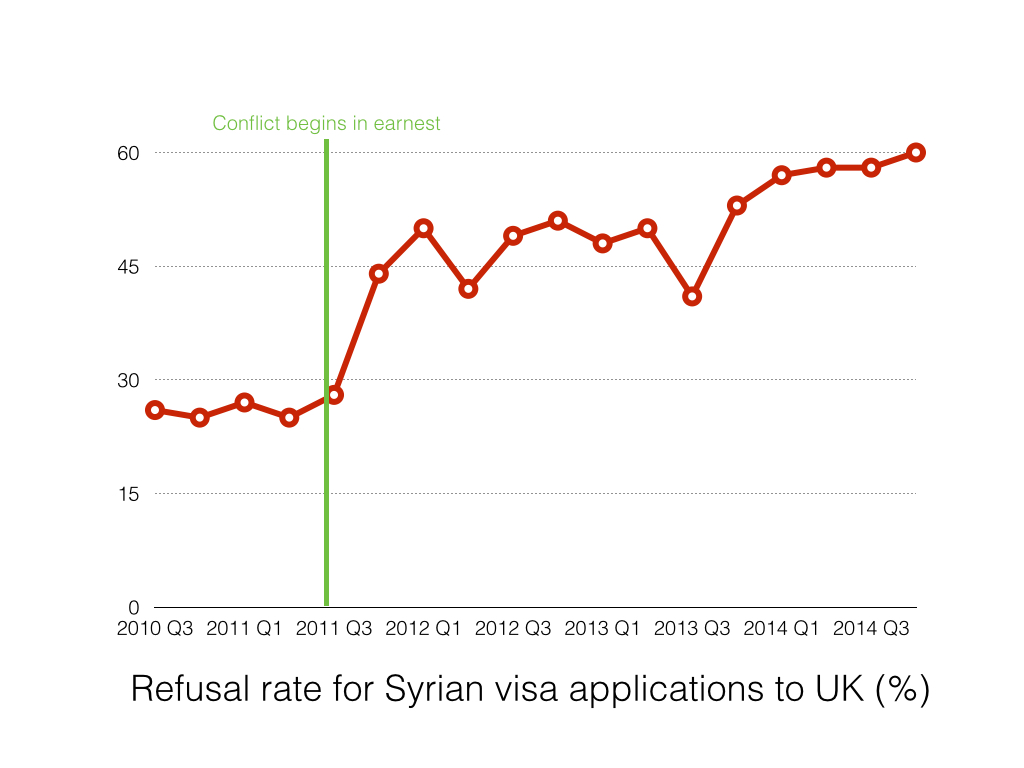- BY Colin Yeo

Refusal rate for Syrian visa applications increases yet further
THANKS FOR READING
Older content is locked

A great deal of time and effort goes into producing the information on Free Movement, become a member of Free Movement to get unlimited access to all articles, and much, much more
TAKE FREE MOVEMENT FURTHER
By becoming a member of Free Movement, you not only support the hard-work that goes into maintaining the website, but get access to premium features;
- Single login for personal use
- FREE downloads of Free Movement ebooks
- Access to all Free Movement blog content
- Access to all our online training materials
- Access to our busy forums
- Downloadable CPD certificates
Back in July 2014 I picked through the official Home Office quarterly statistics to plot the refusal rate for visa applications by Syrians to travel to the UK since 2010. There are many Syrians with family or other links to the UK who, perhaps despite or perhaps because of the conflict, still want to be able to visit, study or work here.
I found that the refusal rate had climbed from below 30% to 57% over the course of the conflict.
Looking at the latest statistics, released on 26 February 2015, that upward trend in refusals has continued and the refusal rate stood at exactly 60% in the fourth quarter of 2014. See the data table Entry clearance visas granted outside the UK data tables immigration statistics October to December 2014 volume 1.
It was only after huge cross party and civil society pressure that the UK Government was embarrassed into announcing on 29 January 2014 that it would run its own resettlement programme. No commitment on numbers was given at the time. That was over a year ago. The latest official statistics revealed that a mere 143 Syrians have been resettled in the UK under the programme. Compare and contrast that against the 30,000 places offered by Germany. You can read more here about the way in which the “quick, efficient and friendly” German scheme operates. Also compare and contrast these figures against the 1.1 million Syrian refugees in Lebanon, a very small country where the refugees now make up around 26% of the total population.
It isn’t even as if the UK is taking more direct asylum applications than Germany from Syrians who do manage to reach our shores. Between 2011 and 2014 Germany granted asylum to 43,000 Syrians on top of the resettlement scheme, 10 times as many as the 4,292 grants here in the UK. To add insult to injury, the UK has even pursued removal action against Syrians, trying to off load them to other EU states: 50 Syrians were removed to other EU states by the UK between January 2013 and December 2014, The Guardian reports.
It is worth pausing for a moment to consider why Syrians are fleeing their country. There is a massive, almost unimaginable humanitarian disaster. There is a vicious civil war going on, cities lie in ruins, barrel bombs cause indiscriminate carnage, chemical weapons have been used and deranged Islamic State lunatics are carrying out mass executions, particularly targeted against any minorities. Meanwhile, in the massive refugee camps in the region there are reports of sexual abuse as well as dire living conditions and appalling winter weather. Resettlement in European states offers stability, a chance for children to be safe, educated, clothed and fed. When the choice is between immense suffering in Syria or the refugee camps and stability in Europe, some are inevitably willing to risk their lives and the lives of their loved ones to cross the Mediterranean.
In 2014, the UN estimates that 3,500 people died attempting the hazardous journey, and that was while Mare Nostrum, the search and rescue operation, was still going. The UK, though, considers that offering patrol and rescue for refugees attempting the hazardous crossing of the Mediterranean is too much of a “pull factor” (as if there was insufficient “push”):
Mare Nostrum was ended in November 2014. Since then, the numbers of refugees dying at sea has increased dramatically compared to the same time the previous year.
Not only is the UK’s hospitality miserly, our Government believes that refugees should be drowned in order to deter others.
UPDATE: shortly after this post was published the UK Government also introduced new rules preventing Syrians with US visas from transiting through the UK lest they commit the “abuse” of claiming asylum. Read more here.
You can see some charts offering comparisons refugee resettlement numbers over at The Guardian as of 2014.
SHARE




